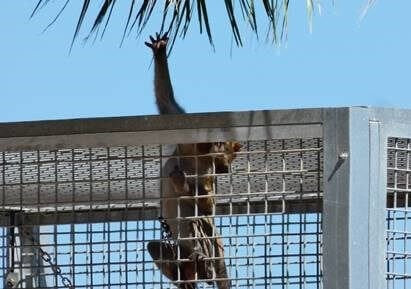Charles River Labs Misleads Shareholders on Sourcing of Monkeys; PETA Urges SEC to Investigate
For Immediate Release:
April 18, 2024
Contact:
Tasgola Bruner 202-483-7382
PETA filed a complaint today with the U.S. Securities and Exchange Commission (SEC) over a series of misleading statements that Charles River Laboratories Inc. has made to shareholders about how it has obtained, imported, and sold countless endangered long-tailed macaques who may have been illegally abducted from their forest homes and falsely labeled as animals bred in captivity.
Charles River, the largest primate experimenter in the U.S., is already under investigation by the SEC over its sourcing of primates and is also under civil and criminal investigation by the U.S. Department of Justice (DOJ) for possible violations of monkey-importation laws.
In a letter sent today to Gurbir S. Grewal, the director of the SEC’s Division of Enforcement, PETA provides evidence that the company has misled shareholders about its ties to the alleged smuggling operation—including that the company has purchased monkeys from the two unindicted coconspirators who were named in a recent trial.
- A DOJ indictment alleges that monkeys sold by Vanny Bio Research Corporation Ltd. (VBRC) in Cambodia were laundered as “captive-bred” even though they were caught in the wild. The indictment referenced two unnamed coconspirators—later revealed in court testimony as major U.S. primate importers Worldwide Primates and Orient BioResource Center (now Inotiv).
- Following the indictment, Charles River stated in an SEC filing that it “does not have any direct supply contracts with the indicted Cambodian supplier” [emphasis added]. But Charles River’s laboratories in the U.S. had received at least 962 long-tailed macaques from Worldwide Primates, whose primary Cambodian supplier was VBRC, and its facility in Montréal received at least 10 shipments.
- The company also received at least 2,730 long-tailed macaques—mostly of Cambodian origin—shipped to its laboratories across the country from Orient BioResource Center in Alice, Texas.
- When Charles River couldn’t continue to import Cambodian-origin monkeys into the U.S, it began importing more of them into Montréal instead.
- Using public records, PETA also identified that hundreds of monkeys at Charles River’s facility in LaBelle, Florida, had apparently originated from VBRC. The surge in these Cambodian-origin monkeys exiting the Charles River facility—immediately after the indictment had named VRBC as a monkey-laundering site—warrants scrutiny by the SEC.
- The company later stated that it “is steadfastly opposed to the illegal importation of non-human primates (NHPs) that are not purpose-bred in accordance with applicable laws” and that it was working to “reinforce confidence that the NHPs we import are purpose-bred.” But this statement contradicts the company’s subsequent actions. In November 2023, Charles River acquired a 90% controlling interest in Noveprim Ltd., a Mauritius-based supplier of nonhuman primates. Undercover investigation footage revealed that Noveprim captured long-tailed macaques in the wild before exporting them—including to Charles River.
“Charles Rivers Laboratories says one thing and does another, but the evidence is clear: It has been selling monkeys ripped from their forest homes,” says PETA primate scientist Dr. Lisa Jones-Engel. “This risks the spillover of diseases to humans and compromises the results of scientific studies.”

Credit: Abolición Vivisección
Long-tailed macaques have been driven to the brink of extinction in large part due to the international monkey-laundering business. Importing monkeys also poses a grave and potentially fatal public health risk. Tuberculosis, a highly infectious disease that’s readily transmitted between monkeys and humans, is emerging in primate colonies globally. Monkeys from Cambodia have also been the source of a pathogen so deadly that the U.S. classifies it as a bioterrorism agent.
PETA—whose motto reads, in part, that “animals are not ours to experiment on”—points out thatEvery Animal Is Someone and offers free Empathy Kits for people who need a lesson in kindness. For more information, please visit PETA.org or follow the group on X, Facebook, or Instagram.


